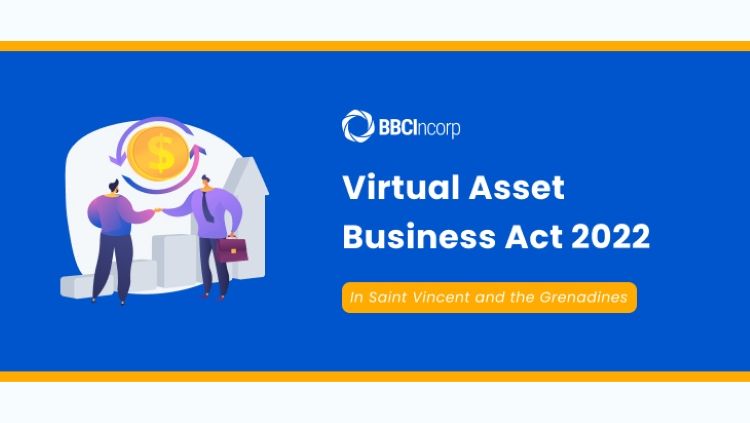
Table of Contents
The Virtual Asset Business (VAB) Act 2022 officially came into effect in Saint Vincent and the Grenadines (SVG) on 31 May 2025. This legislation sets out the legal and supervisory framework for regulating Virtual Asset Businesses operating within or from SVG.
Through this enactment, SVG reinforces its commitment to building a transparent, compliant, and forward-thinking digital asset ecosystem that meets evolving international standards.
Registration requirement for virtual asset businesses
Under the VAB Act, any individual or entity that offers or operates in a virtual asset business in or from SVG must be formally registered with the competent authority.
Existing companies are required to complete their registration applications no later than 31 July 2025. New companies must obtain registration before commencing any virtual asset business operations in SVG.
For a comprehensive understanding, please refer to the VAB Act 2022.
Definition and scope of virtual asset activities
A virtual asset refers to a digital representation of value that may be digitally traded or transferred and used for payment or investment purposes. This definition does not include digital representations of fiat currency or securities.
The term virtual asset business encompasses activities carried out on behalf of another party, such as:
- Exchange between virtual assets and fiat currencies
- Exchange between various forms of virtual assets
- Transfer of virtual assets
- Custody or administration of virtual assets or instruments enabling control over them
- Financial services related to the issuance or sale of virtual assets
Registration criteria and regulatory standards
Fit and proper requirements
To ensure integrity and competence, all applicants and key individuals must meet strict eligibility conditions.
- All applicants and relevant individuals (shareholders, beneficial owners, directors, managers, compliance officers) must pass a “fit and proper” assessment.
- Assessment includes evaluation of financial standing, professional competence, personal integrity, and past conduct.
Structural and operational requirements
Businesses must establish a proper presence in Saint Vincent and the Grenadines (SVG) and meet legal setup conditions.
- Entities without a physical office in SVG must appoint a principal representative who is an ordinary resident of SVG.
- All businesses must maintain a local business address in SVG.
Financial and accounting standards
To promote transparency and financial responsibility, businesses must follow standardized accounting and reporting practices.
- Businesses must prepare and retain accounting records that comply with recognized standards.
- Audited financial statements must be submitted within three months after the end of each fiscal year.
- A qualified external auditor, approved by the authority, must be appointed.
- Companies must meet prescribed capital and liquidity thresholds to ensure solvency and continuity.
Compliance obligations
Robust compliance frameworks are required to protect client data and ensure regulatory adherence.
- Internal control systems must be established, including cybersecurity and data protection measures.
- All client records and operational documentation must be securely retained for at least seven years.
Token issuance and prospectus requirements
A registrant may only engage in the issuance or public offering of virtual assets after meeting the following conditions:
- Submit a prospectus to the authority at least fourteen days before publication
- Obtain a statement of no objection from the authority
- Publish the approved prospectus following clearance
Application procedure
Applications must be submitted through a Registered Agent approved by the Authority.
Each applicant is also required to place a statutory deposit with the Authority, equal to the greater of USD 100,000 or 25% of total financial obligations to clients. This may be made in cash, government securities, or other approved forms.
Upon approval, the Authority will:
- Enter the entity into the official register of virtual asset businesses
- Issue a Certificate of Registration, valid until 31 December of the year of issuance
- Require annual renewal and payment of the Registration Fee by 31 January
Penalties for non-compliance
Entities and individuals are subject to strict penalties for:
- Making false or misleading statements;
- Operating without proper registration;
- Breaching any part of the VAB Act 2022 where no specific penalty is prescribed.
Offenders may face:
- A fine of up to USD 10,000; and
- Imprisonment for up to two years.
In addition, existing companies that fail to apply for registration by 31 July 2025 may be administratively struck off.
Conclusion
The enactment of the VAB Act 2022 reflects SVG’s commitment to a secure and well-regulated virtual asset environment, aligning with global regulatory standards. It provides clear pathways for legitimate businesses to operate while ensuring investor protection and financial system integrity.
All stakeholders engaged in virtual asset activities in or from SVG are strongly encouraged to assess their obligations under the Act and proceed with the necessary steps to comply.
For further assistance or to begin your registration process, please reach out to us at service@bbcincorp.com. We’re here to help you navigate the regulatory requirements smoothly and efficiently.
Disclaimer: While BBCIncorp strives to make the information on this website as timely and accurate as possible, the information itself is for reference purposes only. You should not substitute the information provided in this article for competent legal advice. Feel free to contact BBCIncorp’s customer services for advice on your specific cases.
Industry News & Insights
Get helpful tips and info from our newsletter!
Stay in the know and be empowered with our strategic how-tos, resources, and guidelines.





